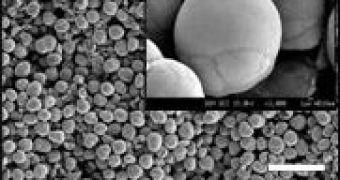Lithium-ion batteries have the bad 'habit' of quickly losing energy storing capacity or even of lighting up on fire when damaged or over-charged. However, Argonne National Laboratory researchers say that they can make these problems go away and increase the storing capacity of Li-ion batteries by up to 30 percent, just by modifying the chemistry of the Li-ion electrode.
The license for the fabrication technology was sold to the Toda Kogyo material supply company which, according to Gary Henriksen, Argonne electrochemical storage research manager, is able to produce more than 30 million laptop batteries per year. Albeit the Argonne facility is not the only one that seems to be experimenting with Li-ion batteries lately. Lithium iron phosphate material can also be used to improve the reliability of Li-ion batteries, however they have an energy storing capability lower than that of traditional Li-ion batteries.
Li-ion batteries use cobalt oxide electrodes, which are the main cause for excessive heating. As the battery is recharged, the oxide gives off heat that builds up inside the battery and, in some cases, it can even lead to combustion. Over-heating occurs because cobalt oxide emits oxygen while being heated, and oxygen reacts with the electrolyte, thus producing even more heat. In order to correct this, the cobalt oxide electrodes are replaced with manganese oxide.
However, replacing the old metal oxides with electrochemically related materials results in a stable but not very efficient battery, unable to store large amount of energy. Such batteries could be subjected to as much as 1,500 charges without losing too much of its storing capacity. Additionally, reducing the amount of energy-storing material actually increases the storing capacity of the battery. But if too much material is removed, then the battery loses the ability to charge and discharge completely.
According to Henriksen, the new electrode can store up to 50 percent more energy than that of some of the best batteries, meaning that the total energy storage capacity of a Li-ion battery can be improved by 30 percent.
The new materials enables the battery to completely discharge the stored energy in three hours, meaning that it is ideal for laptops, but not very good for hybrid vehicles use. In order to make the technology viable for hybrids, the battery must have the ability to discharge at least three times faster than the current rates.
"The new material is a significant improvement over lithium cobalt oxide. If you think about it in terms of a field that grows 8 to 9 percent per year, you saved yourself three years. You may have leapfrogged the competition. I'm sure that anybody who makes cell phone and laptop batteries would be very happy to have that kind of an edge," says professor of materials science and engineering at MIT.

 14 DAY TRIAL //
14 DAY TRIAL //